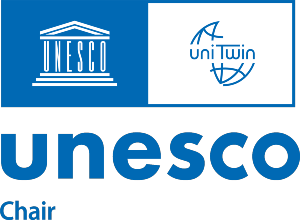News & Events
ILAS Webinar Series: Living Through Covid -19: A Lifecourse Perspective
Date Released: 29 March 2021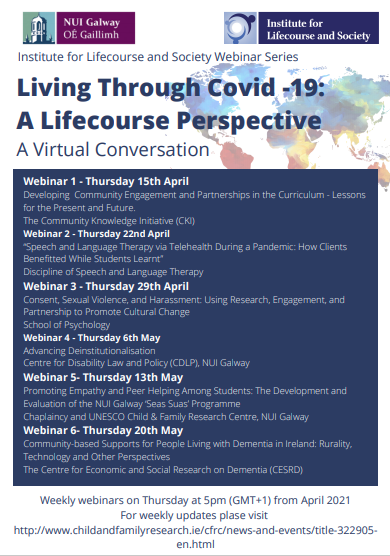
Institute for Lifecourse and Society
Webinar Series
Living Through Covid -19: A Lifecourse Perspective
Thursday 15th April - Thursday 20th May - 5:00-6:00pm
The Institute for Lifecourse and Society (ILAS) supports applied research that informs policy development and practice to make a positive difference to people’s lives. ILAS brings together existing work in relation to targeted populations, such as older persons, children and families, and persons with disabilities into one domain of research, teaching and policy.
About this series:
We are delighted to announce a series of 6 weekly, free to public virtual conversations to be held and hosted by the Institute for Lifecourse and Society (NUI Galway). Each week the virtual conversation, which will be free, globally accessible, and delivered across time zones to the public, will bring together the views of academics, policymakers and most importantly citizens directly affected by the coronavirus and living with its consequences. This will include a focus on kernel issues for children and youth, parents, older people, families, people living with a disability and communities as well as in differing cultural and international contexts. It is hoped the conversations will assist human understanding and compassion in relation to the coronavirus as well as proposed solutions for societies to connect and cope and become more resilient.
Download full Programme here ILAS Webinar Series Programme
Weekly updates to follow
To playback any webinar please visit Here
Webinar 1: Thursday 15th April, 5pm (GMT+1)
Developing Community Engagement and Partnerships in the Curriculum– Lessons from the Present and the Future
Watch live https://youtu.be/rh5V13bwQCY
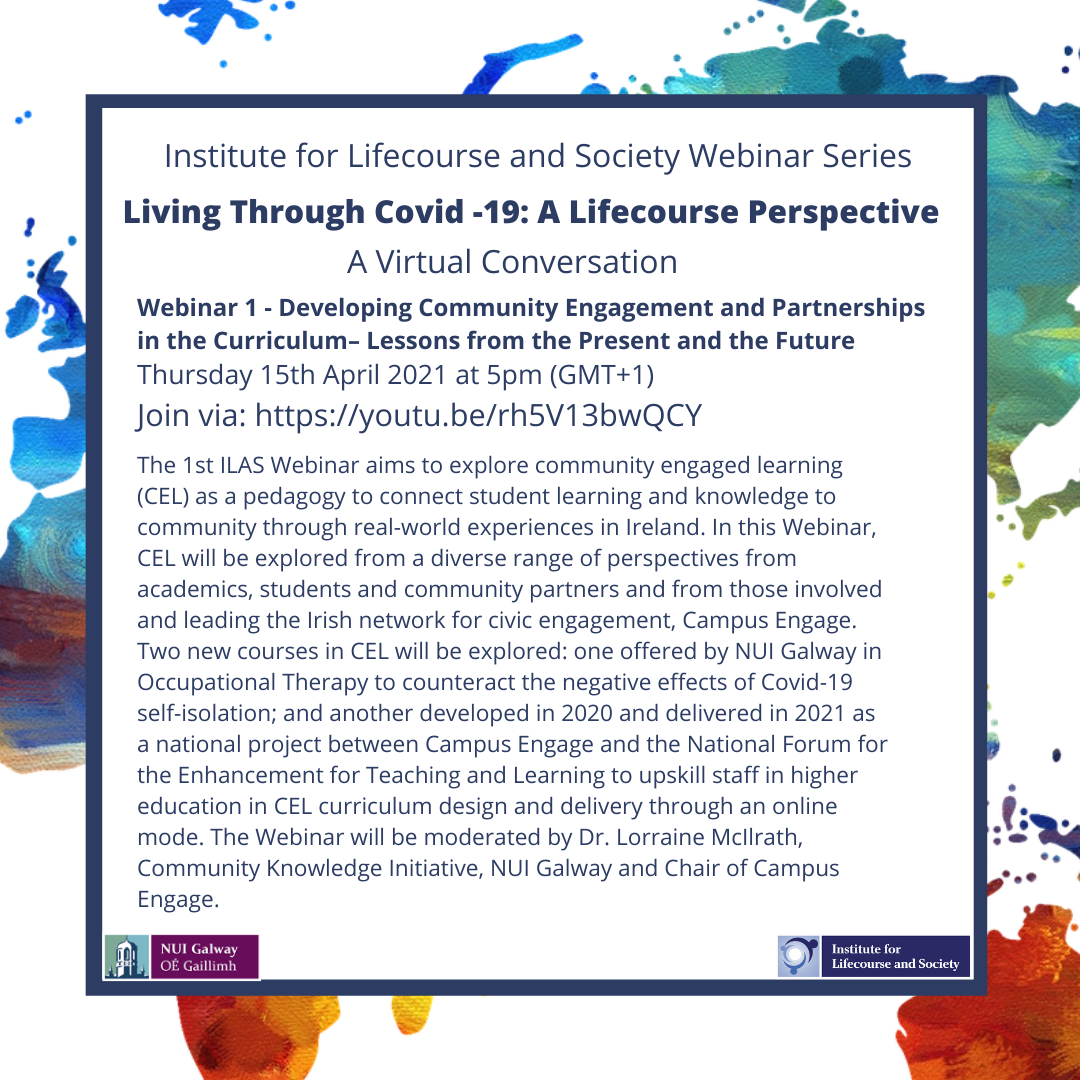
Abstract: The 1st ILAS Webinar aims to explore community engaged learning (CEL) as a pedagogy to connect student learning and knowledge to community through real-world experiences in Ireland. In this Webinar, CEL will be explored from a diverse range of perspectives from academics, students and community partners and from those involved and leading the Irish network for civic engagement, Campus Engage. Two new courses in CEL will be explored: one offered by NUI Galway in Occupational Therapy to counteract the negative effects of Covid-19 self-isolation; and another developed in 2020 and delivered in 2021 as a national project between Campus Engage and the National Forum for the Enhancement for Teaching and Learning to upskill staff in higher education in CEL curriculum design and delivery through an online mode. The Webinar will be moderated by Dr. Lorraine McIlrath, Community Knowledge Initiative, NUI Galway and Chair of Campus Engage.
Welcome: Professor Ciarán Ó hÓgartaigh,President NUI Galway & Professor Pat Dolan, UNESCO Child and Family Research Centre
Speakers: Dr. Hazel Killeen, Lecturer Occupational Therapy, NUI Galway, Siobhan Morahan, Deputy Principal of the Mercy Primary School, Dr. Sinead Hynes, Lecturer Occupational Therapy, NUI Galway, Kate Morris, Head of Campus Engage, Irish Universities Association, Dr. Claire McDonnell, Lecturer in Chemical & Pharmaceutical Sciences, TU Dublin and Facilitator of the National Forum Open Course in Community Engaged Learning
Moderator: Dr Lorraine McIlrath, Community Knowledge Initiative, Institute for Lifecourse and Society, NUI Galway
Webinar 2: Thursday 22nd April, 5pm (GMT+1)
Speech and Language Therapy via Telehealth during a pandemic: How clients benefited while students learnt
Watch live https://www.youtube.com/watch?v=mk2_Vnd6qwY
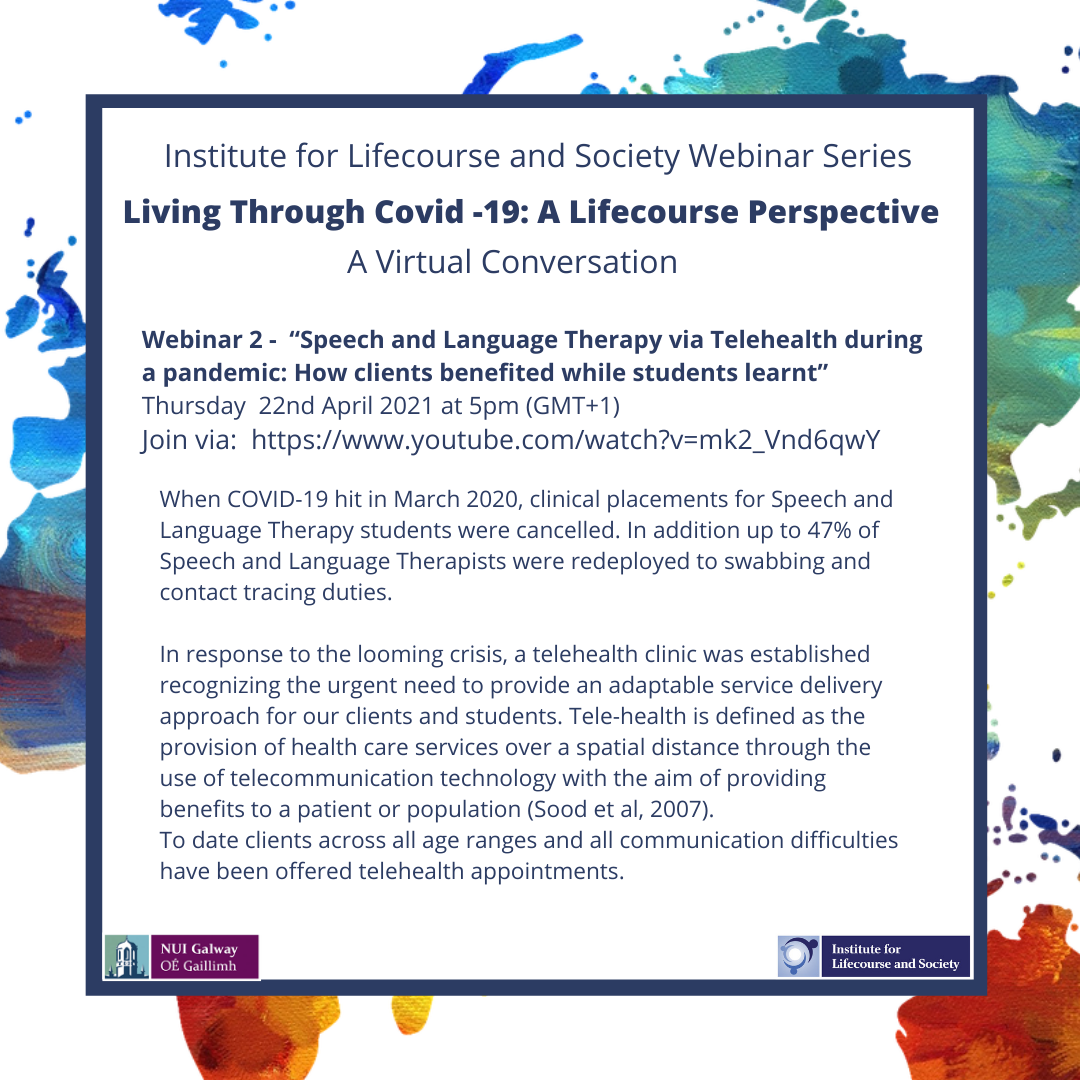
Abstract: “Speech and Language Therapy via Telehealth during a pandemic: How clients benefited while students learnt” When COVID-19 hit in March 2020, clinical placements for Speech and Language Therapy students were cancelled. In addition up to 47% of Speech and Language Therapists were redeployed to swabbing and contact tracing duties. In response to the looming crisis, a telehealth clinic was established recognizing the urgent need to provide an adaptable service delivery approach for our clients and students. Tele-health is defined as the provision of health care services over a spatial distance through the use of telecommunication technology with the aim of providing benefits to a patient or population (Sood et al, 2007). To date clients across all age ranges and all communication difficulties have been offered telehealth appointments.
Speakers: Margaret Rodden (Practice Tutor for HSE Galway), Lauren (Service User) supported by Sonya Gaffney (SLT for Voices for Downs Syndrome, Galway), Clare Mc Dermott and Sheila Keeshan (4th Year Speech and Language Therapy students), Siobhan Ward Lynch (Practice Tutor for HSE Donegal), Dr. Rena Lyons (Director of the Undergraduate Speech and Language Therapy Programme), Laura Loftus (Practice Education Coordinator for the Discipline of Speech and Language Therapy)
Moderator: Laura Loftus (Practice Education Coordinator for the Discipline of Speech and Language Therapy)
Webinar 3: Thursday 29th April, 5pm (GMT+1)
Consent, sexual violence, and harassment: Using research, engagement, and partnership to promote cultural change
Watch live https://youtu.be/hPsRyz9BLvM
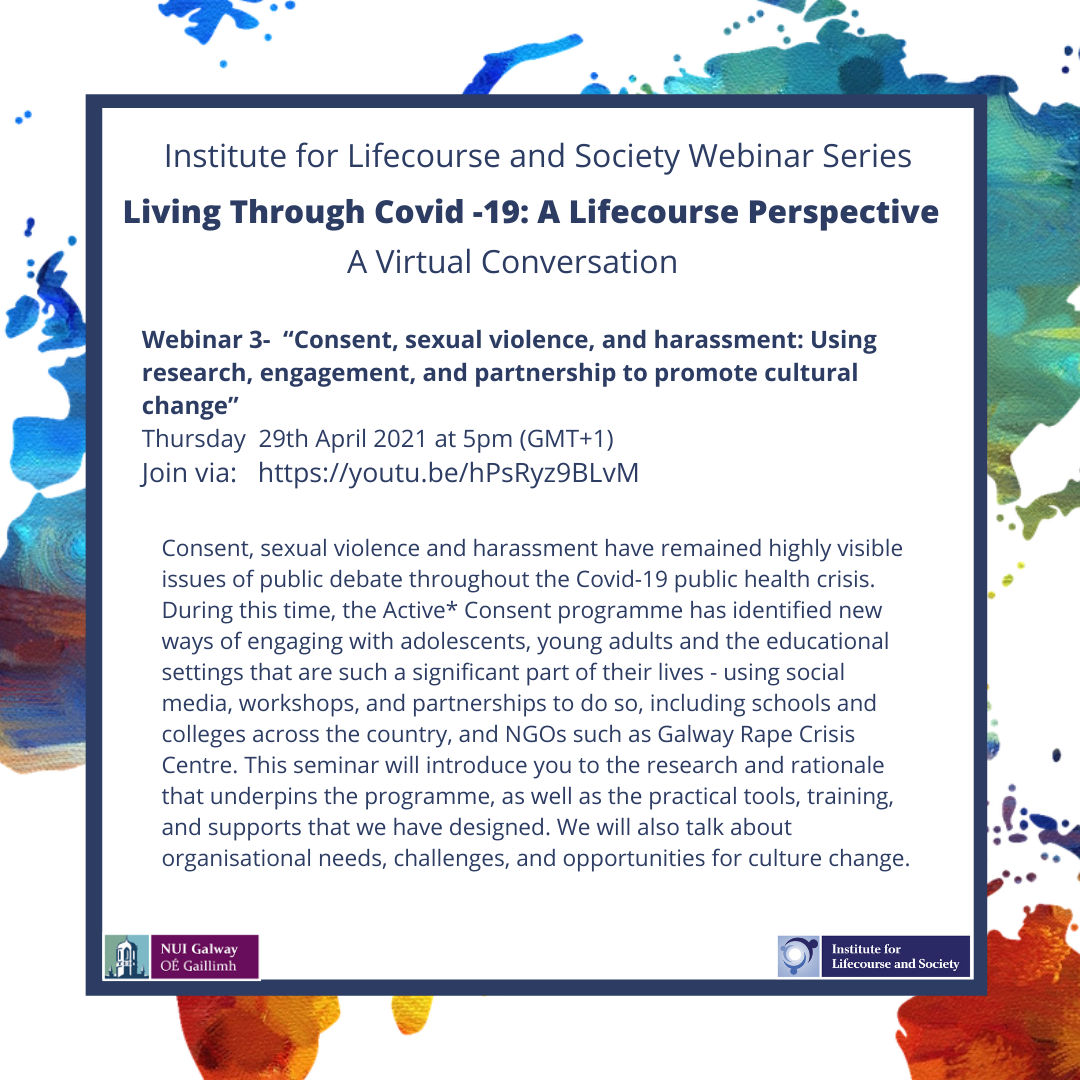
Abstract: Consent, sexual violence, and harassment: Using research, engagement, and partnership to promote cultural change Consent, sexual violence and harassment have remained highly visible issues of public debate throughout the Covid-19 public health crisis. During this time, the Active* Consent programme has identified new ways of engaging with adolescents, young adults and the educational settings that are such a significant part of their lives - using social media, workshops, and partnerships to do so, including schools and colleges across the country, and NGOs such as Galway Rape Crisis Centre. This seminar will introduce you to the research and rationale that underpins the programme, as well as the practical tools, training, and supports that we have designed. We will also talk about organisational needs, challenges, and opportunities for culture change.
Speakers: Dr. Pádraig Mac Neela, School of Psychology, NUI Galway; Dr Siobhan O'Higgins, School of Psychology, NUI Galway
Webinar 4: Thursday 6th May, 5pm (GMT+1)
Advancing Deinstitutionalisation
Watch live https://youtu.be/WnJbZT_GMPI
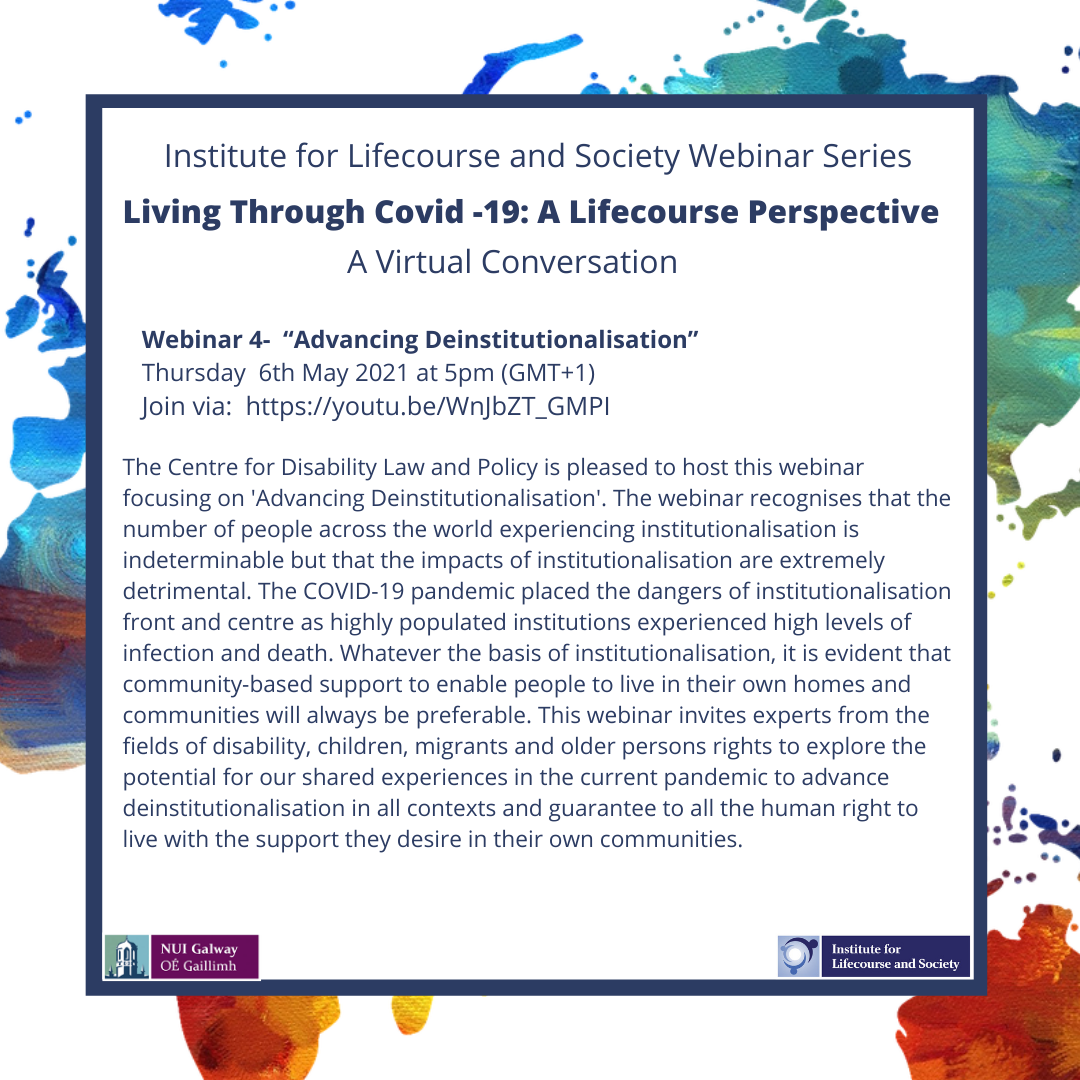
Speakers: Jonas Ruskus, Member of the Committee on the Rights of Persons with Disabilities, Velina Todorova, Member of the Committee on the Rights of the Child, Prof. Felipe Gonzales Morales, the UN Special Rapporteur on Migrant Rights, Nena Georgantzi, Human Rights Policy Office with AGE Platform Europe
Moderator: Áine Sperrin, Centre for Disability Law and Policy, NUI Galway
Webinar 5: Thursday 13th May, 5pm (GMT+1)
Promoting Empathy and Peer Helping Among Students: The Development and Evaluation of the NUI Galway ‘Seas Suas’ Programme
Watch live https://youtu.be/kOu8mGMFHDk
Abstract: Promoting Empathy and Peer Helping Among Students: The Development and Evaluation of the NUI Galway ‘Seas Suas’ Programme
Whilst higher education institutions provide support services to help students who are encountering difficulties, it often falls to fellow students to offer support. However, peers may lack awareness and knowledge about how to intervene or be reluctant to intervene due to the “bystander effect” that diffuses responsibility for action in group settings (Darley and Latane 1968). In this webinar, we introduce the NUI Galway ‘Seas Suas’ programme, which aims to motivate students to be more aware of challenging issues impacting students’ academic and personal lives and to equip them with the knowledge and skills to respond appropriately. Research findings relating to the impact of participation in the programme on students’ social, emotional, and cognitive outcomes over time will be presented.
Speakers: Ben Hughes, Chaplain, NUI Galway, Jimmy McGovern, Seas Suas Manager, NUI Galway, Charlotte Silke, UNESCO Child and Family Research Centre, NUI Galway, Michelle Millar, Dean of Students, NUI Galway, Gemma Patterson, NUI Galway Student
Moderator: Bernadine Brady, UNESCO Child and Family Research Centre, NUI Galway
Webinar 6: Thursday 20th May, 5pm (GMT+1)
Community-based supports for people living with dementia in Ireland: Rurality, technology and other perspectives
Watch live https://youtu.be/t-K06aVDDng
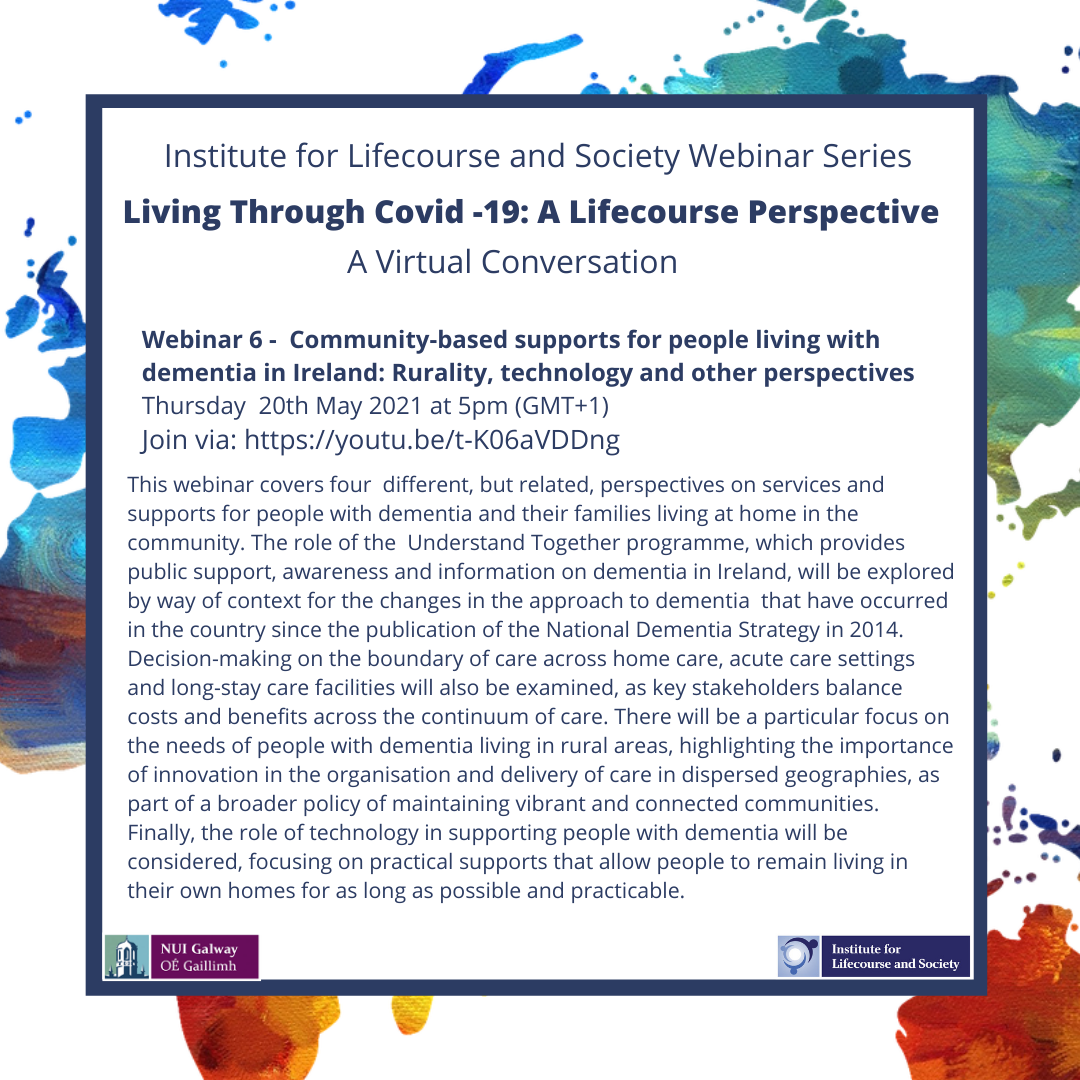
Speakers: Fiona Foley, HSE National Coordinator, Dementia: Understand Together in Communities, Dr Joanne Fegan, HSE Senior Registrar, Psychiatry of Later Life/CESRD, Dr Julie Kosteniuk, University of Saskatchewan, Professor Arlene Astell, University of Toronto
Moderator: Dr Fiona Keogh, Centre for Economic and Social Research on Dementia (CESRD), NUI Galway

